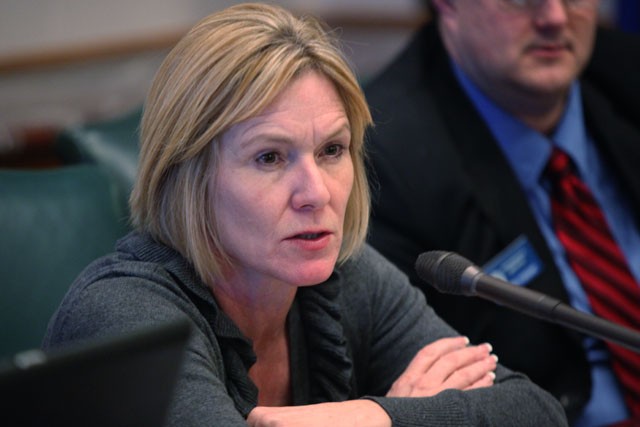Sen. Michelle FischbachâÄôs sofa, which used to sit in smaller quarters, looks out of place in her new digs.
âÄúThat couch looked big in my old office,âÄù Fischbach, R-Paynesville, said.
Moving from the Senate Office Building to the Capitol is one of the perks for Fischbach and the new majority in the Minnesota House and Senate. Another is the opportunity for Republican leadership.
Fischbach, 45, was named chairwoman of the Senate Higher Education Committee in November and is the first woman to be MinnesotaâÄôs Senate president.
FischbachâÄôs political career has focused primarily on finances and social issues like pro-life policies.
Although she has never served on the Higher Education Committee, she isnâÄôt worried.
âÄúIâÄôve served on the Legislature for 14 years. I am very familiar with budget areas,âÄù Fischbach said. âÄúWe all take on new risks.âÄù
Representing a district with five institutions of higher education, including St. JohnâÄôs University, the College of St. Benedict and St. Cloud State University qualifies her for the job, Fischbach said.
With MinnesotaâÄôs looming $6.2 billion deficit, Fischbach agrees that challenges await her committee.
âÄúThere are going to be cuts,âÄù Fischbach said, âÄúbut we will still look to preserve the quality of education.âÄù
While Republicans announced the first phase of impending budget cuts Tuesday, including $89.2 million cut in projected aid to the University of
Minnesota, Fischbach said she could not begin to estimate how much of the deficit would fall on the shoulders of higher education.
But she doesnâÄôt believe tuition has to increase.
Some see the deficit âÄúas an opportunityâÄù for state organizations to become more efficient, Fischbach said. She believes colleges can do the same without increasing tuition.
High salaries for faculty and administration at colleges have raised âÄúsome concernâÄù in the committee and among the public, Fischbach said.
Sen. Scott Dibble, D-Minneapolis, was one of few senators who chose to abstain from voting Fischbach president of the Senate, a victory she called âÄúflatteringâÄù because of its bipartisan nature.
Fischbach is an obstacle to âÄúthe whole idea of free and fair and open debate,âÄù Dibble said. âÄúShe is known to chuck spears and act in a very partisan manner.âÄù
When the House experienced a Republican majority 10 years ago, Dibble said it was âÄúextremely unfair.âÄù He said he fears that under Fischbach, the Senate will follow the same track.
Dibble said FischbachâÄôs appointment as chairwoman on the Higher Education Committee may be due to the number of junior legislators entering the Capitol, leaving Republicans lacking in qualified senators to fill leadership positions.
Sen. Claire Robling, R-Jordan, the ranking Republican
on the Higher Education Committee, said FischbachâÄôs appointment is due to her general experience as a lawmaker.
âÄúShe has an institutional memory and background that qualify her for that position,âÄù Robling said. âÄúShe is a very quick study.âÄù
Both Dibble and Robling agree âÄî Fischbach is known around the Capitol for her friendliness.
âÄúIâÄôve sat on committees with her. I like her,âÄù Dibble said.
The Higher Education Committee has only had two meetings, and senators agree that it is difficult to gauge FischbachâÄôs performance this early in the game.
Calling her early days as Senate president âÄúmammoth,âÄù FischbachâÄôs schedule became exponentially busier, and she can be seen racing through the halls of the Capitol.
âÄúWeâÄôre ready to get to work,âÄù Fischbach said.
She didnâÄôt have specifics on what the Higher Education Committee will focus on this session, adding, âÄúWeâÄôre still looking at the issues. This is the beginning of a long process.âÄù

Image by Simon Guerra
Senator Michelle Fischbach, chair of the Higher Education Committee, listens to UMN President Bob Bruininks testify about upcoming budget cuts Wednesday at the capitol.
Fischbach new head of Higher Ed
The new chairwoman expects to see no tuition increases.
Published January 26, 2011
0
More to Discover







